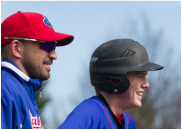As much as we think we have all the answers, coaches need to realize that we don't always know. In fact, we may not know anything for absolute certain. With the rapid changes in technology this is even more true than it was 5 years ago and "cutting edge" teaching is changing more rapidly than ever. Coaches need to have a set of beliefs that they teach from, but they should save the absolutes for their team rules (such as...always respect the officials). In the end, each player will be so vastly different that it will be impossible for one coach to have all the answers for all of their players.
So if we have don't have the answers how do we teach? Maybe Isaac Asimov said it best:
Self-education is, I believe, the only education there is.
I do much of my teaching in an Academy environment where my players come from a variety of teams and go back to their club teams each spring. I am convinced that self-education is the best way for our players to learn, but I also believe that self-education is absolutely imperative when my players will learn different information from a variety of coaches through the season. With self-education players realize that different information from different coaches is actually an advantage and simply provides more perspective on developing their skill set. In addition, this approach ensures that one coach doesn't have to be right and one coach wrong. The player can take in all the information from both sources, engage in valuable conversation about developing that skill, and implement the most useful information gained from both coaches. Engaging in conversation with coaches around skill development is a talent that players need to develop in order to be respectful of coaches and ensure that their coach knows they are listening and continuing to learning. Alan Jaeger calls this "standing your ground" and does an excellent job describing this process on the ABCA Calls to the Clubhouse Podcast. You can listen to that clip here (starting at 46:07).


 RSS Feed
RSS Feed